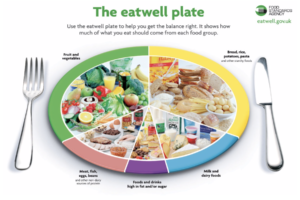Diet.
The food we eat is fuel for our bodies. Not only does it make sure we have the energy to walk to school, do PE and dance to music, but it also fuels your body’s growth. This means growth that makes you taller, that makes our bodies go through puberty and makes our brain develop normally into adulthood. The best way to make sure that your body and brain grow normally, and that you have the energy to do the activities you enjoy, is to make sure you eat sensibly.
We are not suggesting that you can never have a cake ever again, or that ice-cream is evil, but different foods have different values in terms of what they give our bodies; and understanding that can help us to be kinder to our bodies, eat healthier and feel great. There is lots of information about different foods on the Change 4 Life website
The ‘eatwell guide’ below shows you how to plan your meals so they are healthy, balanced and provide all the energy, protein, vitamins and minerals you need. It also gives you some ideas about which foods belong to each category.

Now you are at secondary school, you will be able to choose your own school lunches and maybe buy a snack on the way home, so it’s really important you know what foods are good for you and which foods are just for a treat. The sugar smarts app can help with this, all you have to do is scan the barcode of what you are about to buy and the app will tell you how healthy it is!
The other really important thing to remember is to drink lots of water! Water is really good for our bodies, mainly because we are mostly made of water.
- For healthy recipe Ideas please visit the NHS website
- For information on food safety please visit the NHS website
- For more information on healthy eating and recipe ideas please visit the Be Your Best website
Top Tips for a healthy nutritious daily plan:
- eat at least 5 portions of different fruit and vegetables every day.
- eat 2 to 3 portions a day of beans, chicken, eggs, fish, lentils, meat or other protein foods.
- have 2 to 3 portions a day of milk or calcium fortified milk alternatives; such as soya or oat drinks.
- at each meal choose a portion of nutrient rich starchy foods like wholegrain breakfast cereals, bread, pasta, rice; or starchy vegetables like potatoes and yams.
- drink plenty of fluids; at least 6 to 8 glasses a day.
- small amounts of vegetable oils and spreads can be included, if necessary.
- finally, don’t forget to have your daily vitamin D supplement; it is the only nutrient you can’t get enough from food.
